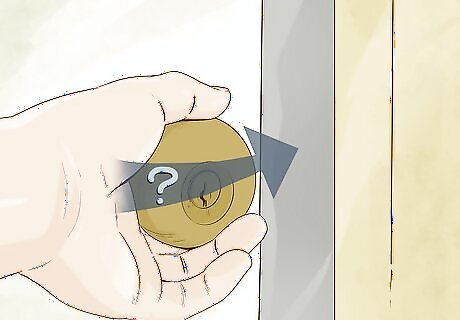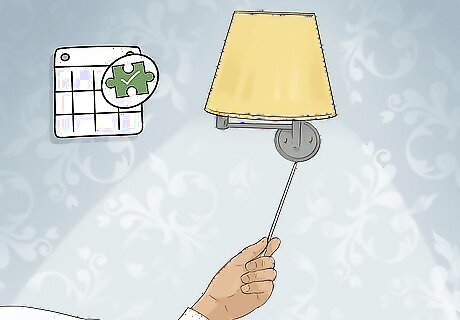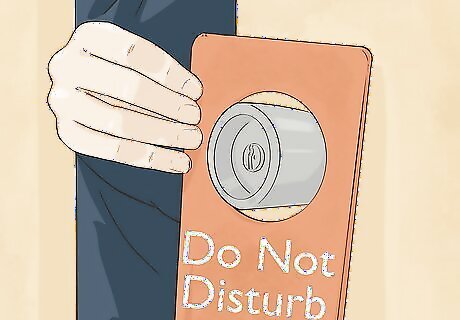
views
Compartmentalizing Effectively

Understand compartmentalizing. Sometimes boundaries have to be put on dealing with the mental or even physical environment one is in. (An example is the EMT on duty who has to put his feelings about her family aside and deal with a crisis at hand). Sometimes these boundaries have to be very hard and necessary. At other times, sometimes they can be an indication of poor decision making (such as someone having an affair) and sometimes they are about survival (a person who buries memories of trauma in childhood).

Being aware of when you have to compartmentalize will help you make decisions on how, why, how much and when you compartmentalize. Sometimes it is appropriate, and sometimes it is not. For example, you may have to put some compartmentalization between home and work to prevent negativity from one to affect the other. However, compartmentalizing in this matter would mean that you control the overlap, and keep it intentionally to a minimum so your home life does not become greatly impacted by your work or vice versa.

Separate streams of thought that are small and time limited. Avoid compartmentalizing large areas of thought that make you who you are. For example, living a double life, one is with your family and another one is with a lover .when one of your major values is to support the integrity of your family life would or could have serious ramifications on your system of values, and both of the lives you have compartmentalized. Smaller items would be that of being a surgeon and a medical director at the same time. The roles are certainly different, but by compartmentalizing, you will be able to aptly manage both roles and reduce the amount of overlap between the two.

Find a way to transition between compartments. Create a system of supporting the separation so that your compartmentalization is effective. Recognize when one set of thoughts merges with another, and remind yourself that at that given moment, what your role and priority are. It's unlikely that you'll be able to snap your fingers and move right from one compartment to the next, but you can come up with a routine, like taking a walk or going for a short drive, that helps you cleanse your mind and move from one thing to the next. If you're transitioning from work to home, tell yourself that you'll have to finish thinking about work at the end of your commute; you can start thinking about it again when you commute to work the next day. College students do this often and well. Taking one course that the student does not enjoy can stop by leaving that classroom, allowing the freedom to fully participate in the next class, one that is enjoyed.

Know that these “compartments” in your psyche are there on purpose. Make sure you are always in control of that separation, and that it does not become a reflex type of a defense mechanism. Remember that just because you're switching between compartments doesn't mean you're avoiding your feelings or impulses; it just means that it's not productive to think about the other area of your life right now, and you'll get back to it later.

Avoid multi-tasking. If you want to compartmentalize as seamlessly as possible, then avoid multi-tasking, especially in between compartments, no matter how small the gesture. You may not think that calling your wife to sort out some home-related stress during your lunch break is breaking your flow, but doing so will make you more stressed and less productive throughout your work day. Of course, if you really have to attend to a personal matter, you shouldn't put it off for too long, but if you can save it until later, you'll be more focused on the task at hand. Avoid multi-tasking within the same compartment, too. Multi-tasking will actually make you less productive and will keep you from fully immersing yourself in any one task.

Give each area extreme focus and move on. When you're situated in one of your compartments, you should give it 110% of your energy. Put away your phone and other distractions and fully immerse yourself in that task, whether it's wrapping up a presentation at work or spending quality time with your daughter. Any time another thought creeps up just say, "I'll get back to that when it's more productive for me to do so." If you give whatever you're doing your full focus, then you'll be able to get it done more quickly and to move on to the next thing. Set a time limit for yourself. Say, "I'm going to work on Project A for one hour before I move on to Project B." This will put more pressure on you to fully immerse yourself in Project A while you can.

Learn to compartmentalize difficult news. If you've heard some devastating or difficult news, then you may want to break down and forgo all of your obligations. But if you want to compartmentalize, you can tell yourself, "I will give this situation two hours of my time. I will write down, think, or say everything that I am thinking or feeling about it before I move forward. This doesn't mean that I have dealt with the issue or that I will tuck away my pain, but it does mean that I will think about it as much as I need to before I end up dwelling or making myself feel worse. I'll pick it up again later, but I won't let it ruin my day -- or my life."

Remember that you can always return to any compartment. Let go of the feeling that you have to deal with every crisis, problem, or situation as soon as it happens and that if you don't get to it, you'll be upset for the entire day. Sure, the unresolved crisis at work is a real drag, but you won't be able to figure it out until your meeting with your boss tomorrow, so take a deep breath, tell yourself that you'll figure it out when you can really return to it, and move on to the next thing.

Ask yourself how you can help the situation by thinking about it more. You've had a fight with your girlfriend. Your son just got accused of shoplifting. Your boss just put you in charge of a new project and it has not been going well. However, you're not in a position to do anything about any of these things right now. So what do you do -- sit around for hours thinking about it, imagining the worst, and replaying your angry thoughts over and over and wasting your energy by thinking about this? Absolutely not. Instead, you ask yourself, "How can thinking about this area of my life improve things?" Chances are, it can't. If thinking isn't solving anything, then move on to the task in front of you and find a magic solution later.

Ask yourself, "How much more productive would I be if I weren't thinking about this one thing right now?" Chances are, you'd get a lot more done at work if you stopped thinking about the fight with your daughter; you would be able to clean the house much more quickly if you weren't worrying about your unsettling talk with a co-worker. Not thinking about these things when you can't do anything about them will actually make you spend even more time doing all the other things you have to do.

Maintain a balanced life. If you want to be able to truly compartmentalize, then you need to have a balanced and stable life, where you feel like you have control over your family, your career, your health, and any other areas that are important to you. If you feel like your personal life is spinning wildly out of control or that all hell breaks loose at work every week and keeps you from sleeping more than three hours a night, then you have to address these situations so feel calmer, saner, and more at peace with all aspects of your life. Once you feel relatively in control of all aspects of your life, then you can truly begin to compartmentalize.
Staying in Control

Avoid too much compartmentalization. Feeling that your life is shattered into too many pieces, or that you cannot departmentalize when you choose, is a warning that you are losing control over how you keep aspects of your life separated. Over time, this could create serious psychological problems. If you get married, and your wife or husband has never, ever met anyone from your pool of friends or your work life, the compartmentalizing is getting out of control.

Make sure you're comfortable with some crossovers in your life. Losing control over how you separate your life and thinking can become habitual. If this happens, when aspects of your life do cross over, things can become complicated or even frightening. You will feel unusually “exposed”, and when members from different aspects of your life do meet, they often may feel that when they mention you, that they are not even talking about the same person.

Know when to stop. If your life, rather than small sections of it, feel like this representation of different feelings and "masks", stop compartmentalizing. Losing control as stated above leads to either greater efforts at compartmentalization, or great fear of two or more segments of your life ever coming into contact with each other. It is damaging to open and honest relationships, and raises suspicion in people who are very strictly assigned to one segment or another of your life.

Maintain both awareness and control over these separations. Know that you are doing this simply to increase the satisfaction and productivity in life is using this compartmentalization in an effective manner. Although you may not encourage talk of your work life at home, it is neither frightening or “feeling caught” if a family member does ask you directly as to what you do or how your day was.

Say no to the things that don't deserve a compartment. One way to stay in control of your compartmentalizing is not to overbook yourself so that you aren't trying to compartmentalize too many different aspects of your life. Don't get involved in a demanding activity like being the president of the PTA or volunteering to help your friend remodel her entire home if your heart isn't in it. Chances are, that if you're trying to compartmentalize, then you probably have enough going on, so try to minimize commitments whenever you can. If you're already managing three projects at work, for example, then learn to say no when you're given the opportunity to manage a fourth. Check out your schedule. If you really want to say yes to a new opportunity, see if there's anything that you can cut out of your life.




















Comments
0 comment